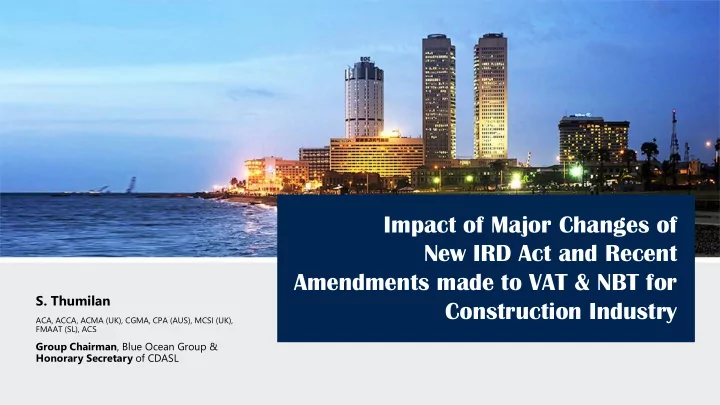

Impact of Major Changes of New IRD Act and Recent Amendments made to VAT & NBT for S. Thumilan Construction Industry ACA, ACCA, ACMA (UK), CGMA, CPA (AUS), MCSI (UK), FMAAT (SL), ACS Group Chairman , Blue Ocean Group & Honorary Secretary of CDASL
Overview • Key Economic Indicators • Trends in Real-estate & Construction Market • Real-estate & Construction Market in Sri Lanka • Real-estate & Construction Industry Contribution • Real-estate & Construction Industry Taxes • Income Tax Rates • VAT Implications • NBT Implications • Economic Service Charges
Colombo, Sri Lanka : A Vibrant Capital Today, the city of Colombo is also known as a “Commercial Hub City” for its massive amplification in infrastructure development. It boasts a highly educated workforce, a clean and verdant environment, modern cosmopolitan values, stable democratic governance, and investor-friendly structures.
Key Economic Indicators - Inflation
Key Economic Indicators - FDI- Sri Lanka
Key Economic Indicators - FDI History
Key Economic Indicators - Employment
Key Economic Indicators - Employment
Key Economic Indicators
Key Economic Indicators
Trends in Real-estate & Construction Market 1) Increasing land prices due to scarcity of lands 2) Expatriates choose Sri Lanka as their second home 3) Increase in Global Investors and their investments 4) Locals invest in Condos for rental yields 5) Aged Citizens feel secure and convenient in condominiums
Real-estate & Construction Market in Sri Lanka Land in Demand As per the study by RIU, with the current drive to modernize city, the land price rates were experienced in Colombo 03, 04, 02 and 01 remaining the most expensive due to non-availability of land for new developments. (Annual Report – RIU, 2017)
Real-estate & Construction Market in Sri Lanka • For a growing high and middle income population, luxury housing is a key attraction in residential markets. Demand for such housing is derived from a growing urban wealthy demographic. In addition to this, non-resident Sri Lankans (NRSLs) are keen to invest in their country of origin also drive demand. (Real-estate and Land Opportunities – JLL, 2017)
Real-estate & Construction Market in Sri Lanka • Expatriates revisiting Sri Lanka : Ageing Population Target Audiences in aboard who are suffering with the climate changes are finding Sri Lanka as their alternative second home. • Growing pollution problems plaguing cities in China and Middle East, were concerned about food safety and water security in the country. • Finest education and good medical facilities has attracted many foreigners to invest and reside in Sri Lanka. • Investors who made previous purchases of condos have tasted the market by earning greater capital gains in the past and looking forward to invest more.
Real-estate & Construction Industry Contribution • Providing skill development and graduate learning opportunities • FOREX earnings to the country when construction industry experienced employees securing jobs overseas • Provide skilled and unskilled employment opportunities • Financial Institution, Insurance and other connected industries benefit with the development of the industry • Infrastructure development of the country • Contributor for the growth of the country’s GDP • Condominium projects bring FOREX to the country • Development of the rural economies
Real-estate & Construction Industry Taxes Taxes Developer Customer Stamp Duty Yes Yes VAT Yes Yes NBT Yes - PAL Yes - Economic Service Charges Yes - Income Tax Yes • The Real estate and the construction industry is burdened with various taxes and levies and sustainability has become a question.
Income Tax Rates Prior to 1 st April 2018 After 1 st April 2018 Construction 12% 28% Condominium BOI Companies are 28% Exempted No Income Tax Exemptions Granted • With the increase tax rates the construction industry will have to pay a higher tax than the previous years • Introduction of 10% capital gains • This will slow down the foreign and local investments in the industry.
VAT Implications Prior to 1 st April 2018 After 1 st April 2018 Residential Accommodation Exempted 15% * * This has been extended by One Year • This will result in increasing prices of residential accommodation and burden the buyers. • This may slow down the industry due to affordability of the buyers.
NBT Implications Prior to 1 st August 2017 After 1 st August 2017 Construction Exempted 2 % (on turnover) Residential Accommodation Exempted 2 % (on turnover) • NBT has a cascading effect, same like the Turnover Tax in the past • Increasing cost of the projects.
Economic Service Charges • From 1 st April 2017, all companies are liable to pay ESC as at 0.5% (previously 0.25 percent) of the Turnover. • Any unclaimed ESC credit can be carried forward for 2 years (down from 4 years) to be set-off against Income Tax. • This has an impact on the construction industry which is suffering from liquid cash-flows.
Thank You
Recommend
More recommend